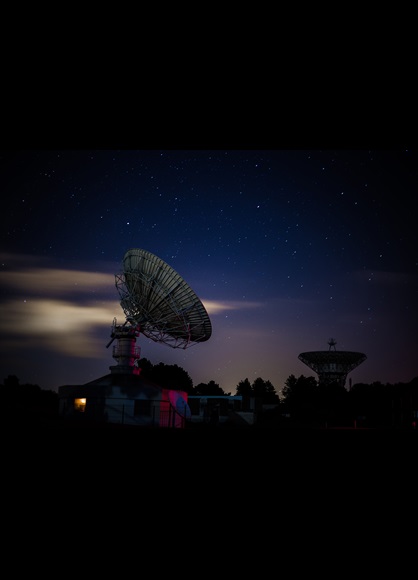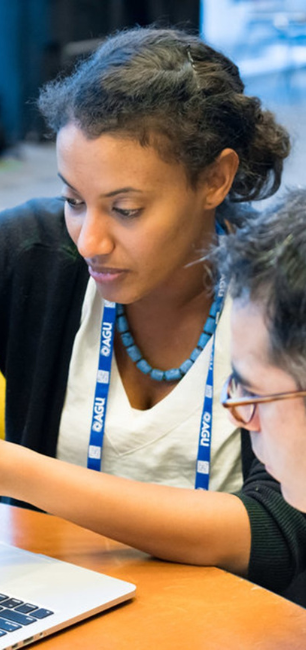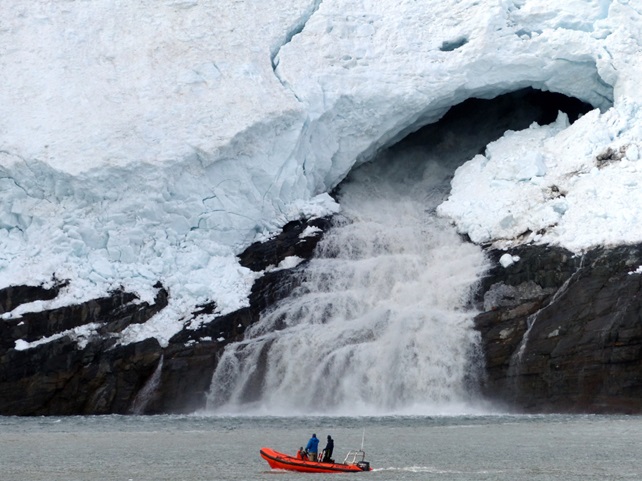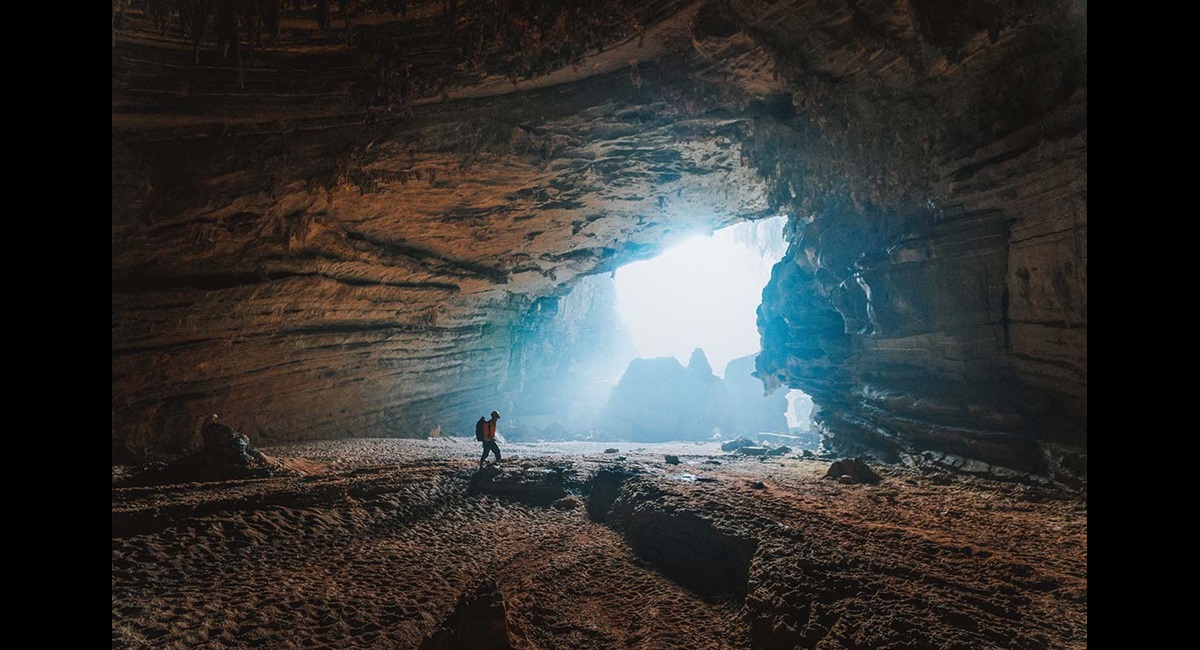
Learn and Develop
Finding and following your path
No matter your career stage, professional and career development are important to advancing yourself and helping guide others. AGU provides career and educational resources, webinars, mentoring services, and support for students and professionals at all levels in Earth and space science.
At AGU, we’re especially committed to inspiring and educating present and future generations of diverse, innovative, and creative Earth and space scientists. We know that the impact of our science grows when individuals and groups who aspire to contribute to science are welcomed and supported and when we have a strong pipeline. By helping all people at any stage of their careers, and through a commitment to creating ethical, inclusive and diverse work environments.
Career resources
-
AGU Bridge Program –The AGU Bridge Program is part of the Inclusive Graduate Education Network (IGEN), an effort to develop, adopt, and share inclusive practices for recruiting, admitting, and retaining historically marginalized students in STEM graduate programs. Partnered with 51 geoscience departments across the nation, the AGU Bridge Program offers students one free application to all partner departments, and a variety of resources and support along the way to their goals for graduate school.
-
Career Center Newsletter – This monthly email newsletter will provide you with tools to help advance your career. Tailored to students and early career scientists, it offers career and professional development articles and recent job postings.
-
On the Job blog – Visit the blog for career advice and workforce guidance for students, and early-career and established professionals who are interested in pursuing professional enrichment.
-
Resources for faculty – Check out our resources for faculty, including information about AGU’s Heads and Chairs program for leaders of Earth and space science departments or join the Education Section.
-
Eos career and education articles – Read the latest Eos articles related to education and careers.
-
AGU Connect – Have dynamic and real-time discussions with your peers about timely issues in Earth and space science.
-
Resources for K-12 education – Learn more about sharing Earth and space science with a K-12 audience through activities and resources from AGU.
-
Working at AGU – Apply for an open position at AGU and help us advance Earth and space science for the benefit of humanity.

Fellowships and internships

Voices for Science

Congressional Science
Fellowship

Community Science Fellows (Thriving Earth Exchange)

Federal internships and job opportunities

Internships at AGU

AGU Bridge Program

Mass Media Fellowship

Find a Job
Post a job

About Paths Through Science
Paths Through Science is a tool for you to explore the many directions a career in the Earth and space science can take. You can investigate the fields represented in each sector (academia, government, industry, and nonprofit) or browse through our directory of profiles. We have also introduced video profiles for some of our Paths Through Science subjects.
Paths Through Science: "Glaciers are the interface between land, atmosphere, and ocean.”
Ethics and diversity in the scientific workplace
AGU is addressing harassment directly by establishing expectations of conduct within our community, promoting responsible science and ethical leadership practices, and expanding diversity. We were the first scientific society to define harassment as scientific misconduct within our formal Ethics Policy [PDF] and we are working to educate, promote and ensure responsible scientific conduct and foster a positive work climate in science through the AGU Ethics and Equity Center.

Webinars

Mentoring programs 
We support several mentoring programs that establish connections between students/early career scientists and more experienced scientists. Our mentoring programs advance the scientific community by helping scientists build successful careers and networks in Earth and space science. Whether you are a mentor or a mentee, our programs can help you develop relationships with others who can help you learn and grow as a scientist.
-
1
Mentoring365 is a global opportunity that allows individuals who are interested in the Earth and space sciences (ESS) to connect one-on-one with other professionals for advice. Mentees and mentors can engage in one-time meetings or long-term connections to help move their careers and education forward. Learn more here or Apply to be a mentor or mentee today!
-
2
In addition to Mentoring365 one-on-one mentoring, we now offer Mentoring365 Circles. A group learning format that connects you with others in the Earth and space sciences who share common interests or learning objectives. Learn together as a group on various topics such as Careers outside of Academia or Science Communication. Learn more here or sign-up for Mentoring365 to join Circles!
-
3College of Fellows Mentoring Network helps build professional networks, create opportunities, and reduce obstacles for recent PhD graduates in Earth and space science. Each network is composed of two senior scientists and six early career scientists.
-
4
Mentoring365 Live connects students and early career professionals with experts to expand their network and receive targeted advice during an in-person scientific meeting. Participants commit to a minimum of one 30-minute in-person mentoring session during the meeting, however, we encourage mentors and mentees to schedule additional sessions. Visit the website for more information and learn how to sign up to become a mentor or a mentee at the AGU Annual Meeting. Registration for Mentoring365 Live is now open.

Resource Guides
- Finding Your Career – this guide is designed to help you through the process of finding the right career
- Careers in the Geosciences – this guide is designed so that you can explore some basics about the variety of geoscience careers that are available.
- Data Sharing Resources – this guide is designed to get you started on some data sharing fundamentals.
- Graduate School – this guide is designed to help you through the graduate school application process.
- In the Field – this guide is designed to introduce what to expect, how to prepare, and how to stay safe in the field.
- Mentoring Skills – this guide is designed to give you resources to build your skills as a mentor or mentee.
- Nontechnical Skills – this guide is designed to give you advice on expanding your repertoire of nontechnical or “soft” skills, as they are often referred to.
- Publishing – this guide is designed to give you advice on getting your research published.
- Science Communication – this guide is designed to get you started with some general information from AGU’s Sharing Science program about science communication and why it is an important skill.
- Tackling Obstacles – this guide is designed to provide you with advice on overcoming common professional barriers.
- Technical Skills – this guide is designed to give you advice on building some general technical skills for scientists.
Contacts
Assistant Director Grants & Education
+1-202-777-7522 | pasher@agu.org
Liz Gilden
Program Manager, Mentoring and Careers
+1-276-221-0212 | lgilden@AGU.org
Waverly Lau
Mentoring Program Coordinator
+1-202-777-7532 | wlau@AGU.org
Student science competitions


OSPA

Virtual Poster Showcase

Bright STaRs

Data Visualization

Apply for a research grant or scholarship
Travel and research grants and scholarships
![]()
Through our travel and research grants and scholarships, we help promote the professional development of the next generation of Earth and space scientists and enable the next era of scientific discoveries. These programs provide the opportunity for scientists to participate in career-building activities early in their careers.
We offer travel grants for students planning to attend AGU meetings and conferences. The program provides financial assistance to U.S. and international early career scientists and students who have little or no support from research contracts or grants, and who are presenting for the first time at a conference. Our research grants and scholarships provide the support necessary for students and early career scientists to complete research and advance their education and careers.

Available fellowships, grants, and scholarships
AGU Student Travel Grant
The AGU Student Travel Grant provides financial assistance for student presenters at AGU’s Meeting to offset costs associated with attending in-person or participating virtually. Any AGU student member presenting at the AGU Annual Meeting may apply, but preference will be given to students from demographic groups that are underrepresented in the sciences.
Basu Innovation Scholar Grant
Beginning in 2021, the Basu Innovation Scholar Grant, provided through the generosity of Sunanda Basu, will provide travel support (up to $2000) to an early-career scientist / recent Ph.D. graduate making an impact in the area of space physics and aeronomy, through innovative approaches to observation and interpretation, to attend the AGU Meeting and will complement the William B. Hanson Lecture.
Berkner Fellowship
The Berkner Fellowship is awarded to early career scientists and students under 35 years of age who are citizens of countries designated by the World Bank as “low” or “lower-middle” income per capita.
Bruno Martinelli Travel Fellowship
The Bruno Martinelli Travel Fellowship provides funding for Latin American science graduate students or early career scientists to attend and present a paper on a volcano-related topic at an international conference or workshop of their choice (not including AGU’s Annual Meeting).
Chapman Conference travel grants
Various deadlines
David E. Lumley Young Scientist Scholarship
The David E. Lumley Young Scientist Scholarship is awarded to high school and undergraduate students studying energy and environmental science.
David S. Miller Young Scientist Scholarship
The David S. Miller Young Scientist Scholarship is awarded to undergraduate or graduate students in the geo-environmental sciences and geo-environmental engineering. Applicants do not need to attend AGU’s Annual Meeting to be eligible nor do they automatically receive a travel grant for the AGU Meeting.
Dr. Edmond M. Dewan Young Scientist Scholarship
Frontiers In Hydrology Berkner Travel Fellowship
Applications currently closed
Frontiers In Hydrology Meeting Early Career Travel Grant
Frontiers In Hydrology Meeting Student Travel Grant
GSSI Student Grant
Horton Research Grants
June Bacon-Bercey Scholarship
JpGU-AGU Meeting Travel Grants and Fellowship
The Lawrence A. Taylor Research Fund in Petrology and Geochemistry
Beginning in 2021, The Lawrence A. Taylor Research Fund in Petrology and Geochemistry, provided through the generosity of Dong-Hwa Shin (Dawn) Taylor, will provide $4000 grants for two PhD students pursuing research in the fields of Petrology and/or Geochemistry and who demonstrate excellent research in their field.
Paros Scholarships in Geophysical Instrumentation
WDS Opportunity Fund for New Diversity in Engineering and Research (WONDER) Grant
Follow the latest in education and career development
-
Career Center newsletter – This monthly email newsletter will provide you with tools to help advance your career. Tailored to students and early career scientists, it offers career and professional development articles and recent job postings.
-
On the Job blog – On the Job is an AGU blog, that provides career advice and workforce guidance to Earth and space science students, as well as early-career and established professionals who are interested in pursuing professional enrichment.
-
Webinars – AGU webinars help you reach your full career potential whether you’re strengthening your skills in a specific area or learning about new research and professional trends. Sign up for an upcoming webinar or view our archive of past webinars.

AGU Career Guidance
AGU Career Guidance is a free, member-exclusive, virtual program that helps AGU members advance their career and science goals.
Students and professionals at any career stage are encouraged to apply and choose between two topics; advance your career or advance your science.
Each topic session spans a month, beginning with two weeks of self-reflection, followed by a virtual event to facilitate collaborative group discussion, and concluding with another two weeks of self-assessment.
**Due to the hands-on nature of this program, seats are limited.**

Program Participant: Everything You Need to Know
How It Works
Program participants will have exclusive access to one of two online session topics: advancing your career or advancing your science. Activities include learning how to set goals, recognize your potential, and explore career or scientific pathways in a collaborative group setting. Each session topic takes approximately one month to complete and occurs in a group setting.
A participant is only permitted to join one session at a time, but all participants are welcome to join the second topic after the conclusion of their first. To participate, AGU membership is required.
Why You Should Join
Being a program participant in AGU Career Guidance offers an unparalleled opportunity to accelerate your professional development. Whether you're looking to advance in your current role, transition to a new position, or simply gain clarity on your career path, this program offers AGU resources and hands-on support you need to succeed.
Benefits
- Receive personalized career guidance and resources
- Propel your career and your science through AGU offerings
- Connect with peers and collaborators who share your same goals and interests
Participant FAQ
What are the benefits of being a participant in the AGU Career Guidance program?
How can this program help me with my goals?
How is each session structured?
What networking opportunities are available through this program?
How to Become a Career Guide
What is an AGU Career Guidance Program Guide
Career Guides in AGU Career Guidance are the backbone to the program. They help lead program participants identify career opportunities, determine paths for growth, aligning with one of the two session topics; advance your career or advance your science. Every step of the way, guides help program members identify and strategize their goals with AGU resources.
Time commitment
We ask for a commitment to host four-month long sessions. Each session spans a month, beginning with two weeks of self-assessment for program participants, followed by a live virtual event to facilitate collaborative group discussion, and concluding with another two weeks of self-reflection. Time commitment from guides is estimated to be 90 minutes, per session.
Why You Should Join
Volunteering as a Career Guide in the AGU Career Guidance program is a valuable experience for personal growth, as well as a means of giving back and connecting with AGU members that are emerging scientists and professionals.
All career guides will receive on-demand training, reference materials, and the opportunity to connect with fellow guides, ensuring full preparation for this role while honing leadership and other skills that are transferable to their own career.
If this seems like a great fit for you - review the eligibility requirements and contact AGU today!
Eligibility Requirements
Willingness to commit and host at least four-month long career guidance sessions. Each guidance session lasts one month and includes one one-hour zoom meeting and time for asynchronous interaction with group members, approximately 2 hours per guidance session.
Career Guide FAQ
What is the role of a Career Guide in the AGU Career Guidance program?
Career Guides in the AGU Career Guidance program help members identify career opportunities, determine paths for growth, and identify with topics such as advancing one’s career or science. They also host one live group event per session to facilitate collaborative discussions and support members in strategizing their goals with existing AGU resources.
Why should I volunteer as a Career Guide?
Volunteering as a Career Guide is a valuable experience for personal growth and allows you to give back to the AGU community. You'll receive on-demand training, reference materials, and opportunities to connect with fellow guides, developing a transferable skillset for your own career path.
What are the main responsibilities of a Career Guide?
Career Guides assist program participants in identifying career opportunities, determining paths for growth, and facilitating collaborative discussions. They provide support in strategizing goals with AGU resources and host one live group event per session.
How is each session structured?
Each session will occur in the career guidance platform and will span a month, beginning with two weeks of self-assessment, followed by a live event to facilitate collaborative group discussion, and concluding with another two weeks of self-reflection. Each live event is virtual and will be held on zoom. Resources and examples will be provided to guides to ensure a successful live event.
What training and resources will I receive as a Career Guide?
As a Career Guide, you'll receive comprehensive on-demand training, reference materials, and the chance to communicate with fellow guides as well as AGU staff prior to kick-off of your first session. This preparation ensures you are fully equipped for the role and enhances your own career skills.
What support will I have as a Career Guide?
Career Guides are part of a private forum where they can share best practices, ask for help, and stay updated on the latest mentorship and career guidance trends. This community provides ongoing support and fellowship.
How long is the time commitment for a Career Guide?
Career Guides are expected to commit to host four-month-long Career Guidance sessions. Each session lasts one month and includes a one hour zoom meeting and approximately 30 minutes of asynchronous interaction with group members (total time commitment is 90 minutes per session).
What are the eligibility requirements to become a Career Guide?
Eligible candidates should be willing to commit to host atleast 4-month long career guidance sessions; complete a self-paced training module; facilitate asynchronous and real time discussions with a group of 10-15 program participants; and host a one-time virtual online meeting. Additionally, candidates should possess traits such as ability to nurture, be empathetic, and be an active listener and be proficient with online communication tools. AGU membership is required to participate as a Career Guide.
How can I apply to become a Career Guide?
To apply, submit an online application in the career guidance platform highlighting your background information and your interest in becoming a guide. You'll receive additional communications about the next steps if selected.
How are Career Guides selected?
Selection of Career Guides is prioritized to ensure diversity in career stage, work sector, and geographic location. Candidates with prior AGU volunteer experience and desired strong soft skills are preferred. Guides will be notified of acceptance via email from the career guidance platform.


